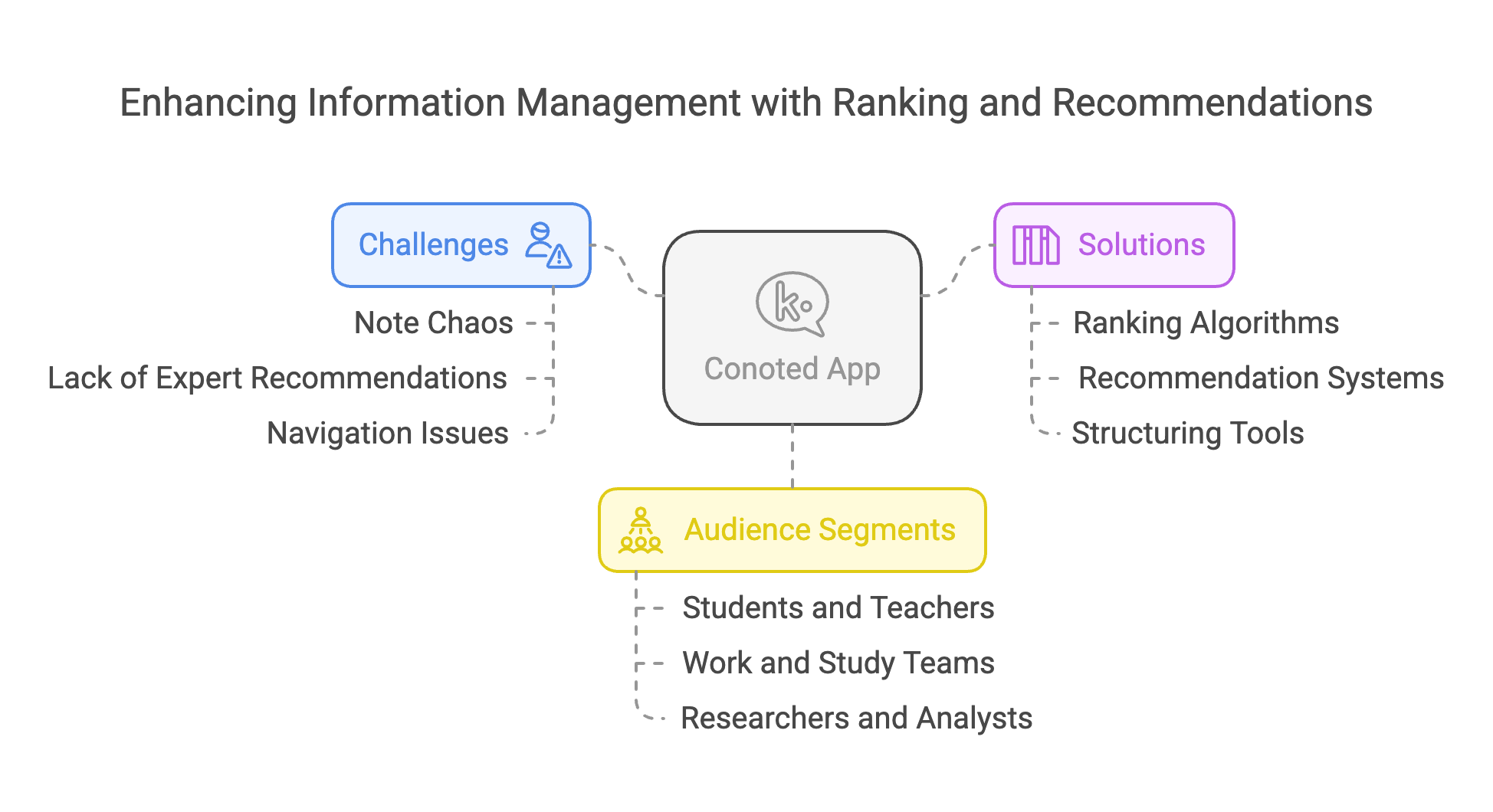When search engines like Google first started out, users struggled with unstructured, unsorted information flow. Similar challenges are faced by Conoted, a note-taking and knowledge-sharing app. The focus remains on two key features: information ranking and expert recommendation. These mechanisms help users find the most relevant and useful information from a large volume of data.
Problems and Solution
1. Note chaos, no ranking
- Problem: Conoted users create a lot of notes that may contain important information as well as less relevant entries. Without an effective ranking mechanism, the relevant notes get lost in the flood of data.
- Google Analogy: Early search engines often returned results that were not very relevant, making it difficult to find the information they were looking for.
- Solution: Develop algorithms that evaluate the quality of notes based on tags, relationships, and user activity, helping to raise the posts that are truly important.
2. Lack of expert recommendations
- Problem: At Conoted, users often need help from experts to solve complex problems or get advice. However, without a proper algorithm, expert recommendations may be inaccurate.
- Google analogy: In the early days, search engines did not always show the most authoritative sources, and users could not quickly find the best results.
- Solution: Improve the recommendation system that automatically suggests the most relevant experts based on tags, group activity, and user profiles.
3. Few tools for deep structuring and navigation
- Problem: Large amounts of data require effective tools for its organization. Users can get lost in a huge array of notes without a clear way to sort them.
- Solution: Multi-level structuring system, including automatic recommendations on tags, relationships, color coding, groups and social graph, helps to create a “living” knowledge base.
---
Audience segments that especially care about this
Students and teachers
- Goal: Effective management of educational materials, lecture notes, research and cases.
- Problems: Loss of important information, difficulty in finding the necessary data, lack of systematization.
- Solution: Ranking and recommendation functions help students quickly find and use the necessary materials, and teachers - to track the development of knowledge of students.
Work and study Teams
- Goal: Quick access to relevant information for making prompt decisions, effective project management and collaboration with experts.
- Challenges: Disparate data, difficulty finding the right ideas in a stream of notes, need for quick expert opinion.
- Solution: Automated ranking algorithms, filtering by tags and expert recommendations allow you to quickly collect the necessary information and form effective teams.
Researchers and analysts
- Goal: Deep data analysis, identifying relationships between ideas, creating knowledge bases for future publications and research.
- Challenges: Difficulty integrating disparate sources of information, lack of tools for high-quality analysis and systematization of data.
- Solution: A multi-level structuring system, including automatic recommendations and a social graph, helps researchers see the full picture and effectively analyze knowledge dynamics.
---
How ranking and recommendations improve your knowledge
1. Increased relevance:
Ranking algorithms raise the highest quality and most frequently used notes, helping users quickly find important information, which is especially important when working with large amounts of data.
2. Quick search for experts:
Recommendations for experts allow you to instantly identify people with the necessary competencies. This is critical for teamwork, when you need to quickly solve complex issues.
3. Dynamic knowledge base updates:
Continuously updating notes and contacts makes the knowledge base “live”. Users see how experts change and what new topics appear in their professional environment, which allows them to stay on the cutting edge of innovation.
4. Simplifying navigation:
Filters based on tags, dates and color coding allow you to quickly navigate a huge array of information, making the search process intuitive.
---
Conclusion
Just like early search engines, when Google was just starting out and struggling with relevance issues, Conoted users also need effective tools to rank and recommend information. When information is constantly being updated, having a living, dynamic knowledge base is critical. This is especially true for students, professionals, and researchers who need to quickly find relevant data and work with experts. Conoted’s improved ranking and recommendation algorithms help users stay one step ahead.
